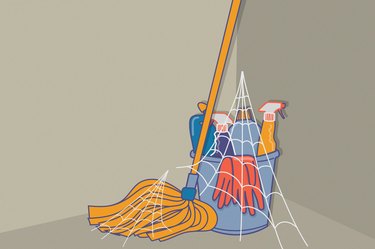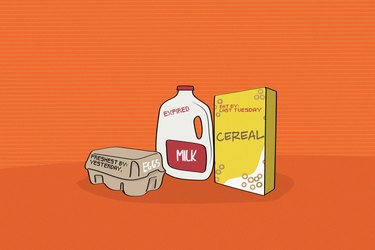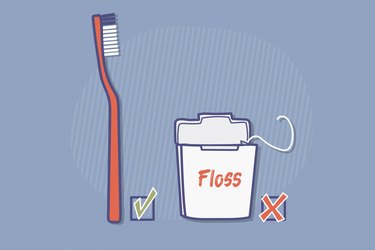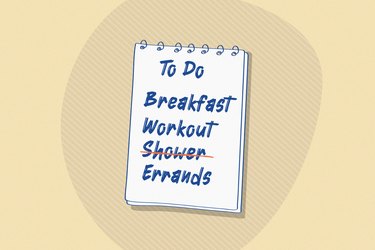
Along with organizing your email inbox and looking for a new job, deep cleaning your house is one of those tasks you know you really should do…but probably keep putting off. After all, who wants to spend the whole day scrubbing floors and scouring the shower — or forking over hundreds of dollars to hire someone else to do it for you?
But aside from your place looking kinda grimy if you never get your neat freak on, could it be bad for your health — causing germs, mold and dust to build up and make you sick?
Video of the Day
Video of the Day
A November 2018 survey from the American Cleaning Institute (ACI) found that 38 percent of people were concerned about whether their cleaning methods would prevent illness and allergy symptoms.
So we got the dirt on what actually matters and what's NBD when it comes to keeping your crib spic and span. (Hint: It's not what you might expect!)
What It Really Means to Deep Clean, and How to Do It
It's a catchphrase that's tossed around a lot, but here's what deep cleaning actually entails.
"Deep cleaning is designed to remove ingrained dirt, such as limescale, and involves cleaning areas that aren't covered as part of your regular cleaning routine," says Henry Paterson, operations executive at Housekeep.
Think: wiping inside cabinets; washing windows; tackling appliances like the oven, fridge and freezer; and even shampooing carpets and steam-cleaning upholstery.
It also targets areas that are often overlooked. "People tend to clean around appliances and furniture," Paterson says. "As part of a deep clean, you'll need to get beneath and behind these items, too."
If you're ready to get down and dirty, Paterson says to have the following tools in your arsenal (any basic supermarket brand will do the trick):
- Multisurface spray
- Limescale remover
- Toilet cleaner
- Floor cleaning product
- Carpet shampoo (that is, if you have carpets)
- Oven cleaning product
- Lots and lots of fresh, clean microfiber cloths
Now clear your calendar and pump your favorite tunes or podcasts.
"Be thorough — deep cleaning is all about getting into the spots you don't usually [clean]," Paterson says. "Give yourself plenty of time so that you can work methodically through each room, making sure that you're cleaning absolutely everywhere you can."
But Is a Deep Clean Really Necessary?
Get this: Unless you're a candidate for Hoarders, probably not.
"The reason is that we can never completely get rid of allergens — including dust mites, pet dander and mold spores," says Erin Reigh, MD, an allergist at Dartmouth-Hitchcock Medical Center. "They build up over time, so it is more important to do a little bit of housekeeping on a regular basis than it is to do one major cleaning."
What's more: "There is evidence that if you do a deep clean, allergen levels are back to where they started only one month later," Dr. Reigh says.
"It is more important to do a little bit of housekeeping on a regular basis than it is to do one major cleaning."
Just Don’t Slack on These 6 Chores
Even though a meticulous, top-to-bottom clean isn't a must-do in order to stay healthy, we're not giving you license to be a total slob. The following household tasks are crucial to keep up with.
1. Vacuuming
Especially if you've got allergies, zipping around with your Dyson on a weekly basis is one of the best ways to mitigate sniffling and sneezing.
"When it comes to dust mites, people primarily react to their poop," Dr. Reigh says. "One gram of household dust contains thousands of dust mites, which each produce about 20 fecal pellets per day." (Wow.)
Now for the good news: "Vacuuming up those pellets once a week will reduce the collection of allergens over time and lower your overall exposure," Dr. Reigh says. Plus, it sucks up bothersome mold spores, pollen and pet dander along the way.
According to the Asthma and Allergy Foundation of America (AAFA), exposure to dust mites and mold spores can aggravate allergy symptoms like sneezing, a runny nose and itchy, watery eyes. It can also trigger an asthma attack, causing difficulty breathing, coughing, wheezing and chest pain.
Although allergy sufferers are at the highest risk of symptoms, the rest of us aren't in the clear. "Dust mites and molds produce certain compounds that are irritating and cause inflammation, even in people even without allergies," Dr. Reigh says. "From an air-quality standpoint, it is important for everyone to vacuum regularly."
Tip
If you have allergies, you may want to spring for a HEPA filter vacuum. Every time you vacuum, you kick up dust and dirt, which increases the amount of allergens floating in the air. “Dust mites settle back to the ground within 15 minutes, while pet dander can stay aerosolized for two weeks,” Dr. Reigh says. “HEPA filters remove those particles.” At a minimum, slip on a mask while vacuuming, or ask a family member to clean for you.
2. Washing Your Sheets
We spend about one-third of our lives between the sheets, and according to AAFA, studies show that more dust mites live in your bedroom than anywhere else in your home — these critters love to burrow into fabric. Filthy sheets and pillowcases are also hotbeds for fungus, pet hair and pollen.
In addition, keeping your sack clean helps you get a solid night's rest. An August 2017 study in Allergy, Asthma, and Clinical Immunology suggests that being congested all night long, due to allergen exposure, can take a serious toll on your sleep. So even if your bedding looks fine, you should still wash your sheets on a weekly basis.
Related Reading
3. Cleaning the Kitchen
"If not cleaned regularly, kitchens can become a breeding ground for bacteria such as E.coli to thrive, which can make you ill," Paterson says.
E.coli is a potentially dangerous organism most commonly found in raw or undercooked ground beef and can lead to severe sickness.
So after prepping food, wash everything you handled. Pay special attention to can openers, cutting boards, countertops and complex appliances like blenders and food processors — according to the University of Rochester Medical Center(URMC), they're at high risk of contamination. Scrub them with hot, soapy water after use or throw them in the dishwasher.
4. Scrubbing the Fridge
Your refrigerator is another top germ harbinger, according to URMC, so it's worth giving it an occasional deep dive.
"Clean it every couple of months to ensure that your food is being stored hygienically," Paterson says.
That means: Take everything out and wipe down shelves and drawers. Clean up spills and remove spoiled food ASAP.
5. Snuffing Out Serious Mold
Surface mold and mildew that collects in the shower and around the sink isn't a big deal. "This is not considered harmful," Dr. Reigh says. "On the other hand, structural mold caused by water damage — say, if you live in an area prone to flooding — can be a problem."
According to FEMA, breathing in certain types of mold can lead to health issues including respiratory problems, eye and skin irritation, headaches and memory loss. The most toxic is black mold, which is splotchy, dark green, gray or black and has a musty odor.
If you have mild mold growth caused by water damage (i.e., the affected area is less than 10 square feet), then you can probably root it out yourself — follow these guidelines from the Environmental Protection Agency. Otherwise, consult a pro.
Related Reading
6. Decluttering
Get on board with the minimalist trend.
"You can reduce reservoirs of allergens by not having extra stuff around," Dr. Reigh says.
In particular, consider tossing soft goods, like rugs, decorative throw pillows and drapes (blinds are better).
Messiness is also bad for your brain. In a September 2017 study in Current Psychology, clutter was linked to procrastination, stress and dissatisfaction. Time to channel Marie Kondo!
What About Cleaning the Bathroom?
OK, so bathroom germs do sound bad: A January 2015 study in the Journal of Clinical Microbiology revealed that public restrooms harbor a slew of microbes, from staph and MRSA to HPV and herpes.
But before you freak out: The University of Chicago researchers who performed the study maintain that these are the same organisms found in home bathrooms, and that they rarely cause us harm.
Should You Disinfect?
In most cases, you can stick to regular cleaning products, according to the Centers for Disease Control and Prevention (CDC). "Disinfectant chemicals like bleach can be irritating to the respiratory tract for some people," Dr. Reigh says. They can also screw with your microbiome.
But when someone sick has been in your home, disinfectant is a more effective way to kill germs. "Viruses can spread through contaminated surfaces, and you should pay special attention to high-touch surfaces, such as door handles," Paterson says. "Look for a product that says, 'kills 99.9% of germs.'"
After 24 hours, it's no longer necessary to disinfect, but you should still clean any areas the sick person came into contact with. Once three days have passed, no extra cleaning is needed.
So, How Bad Is It Really to Never Deep Clean?
Cut yourself some slack.
"Studies have shown that people aren't able to deep clean faithfully — and it's not the end of the world," Dr. Reigh says. "If you periodically do basic cleaning, including vacuuming, that is great."
- AAFA: "Dust Mite Allergy"
- EPA: "A Brief Guide to Mold, Moisture and Your Home"
- Journal of Clinical Microbiology: "Ecological Succession and Viability of Human-Associated Microbiota on Restroom Surfaces"
- University of Chicago: "The microbes growing in a public restroom (and why that's not as bad as it sounds)"
- FEMA: "Dealing With MOLD & MILDEW IN YOUR FLOOD DAMAGED HOME"
- University of Rochester Medical Center: "In the Kitchen: Prevent the Spread of Infection"
- How Much Does It Cost to Deep Clean a House?
- Allergy, Asthma, and Clinical Immunology: "Poor sleep is highly associated with house dust mite allergic rhinitis in adults and children"
- CDC: " Cleaning and Disinfecting Your Home Every Day and When Someone Is Sick"
- Current Psychology: "Delaying Disposing: Examining the Relationship between Procrastination and Clutter across Generations"
- ACI: "2018 ACI National Cleaning Survey Results: Time Spent Cleaning"
- ACI: "Strategies for Spring Cleaning Success"
Is this an emergency? If you are experiencing serious medical symptoms, please see the National Library of Medicine’s list of signs you need emergency medical attention or call 911.



